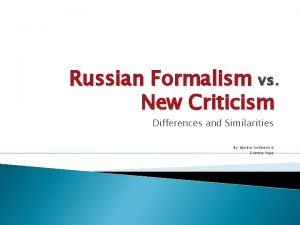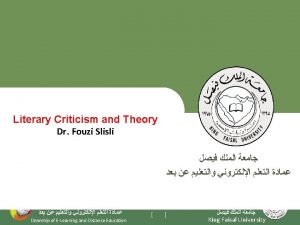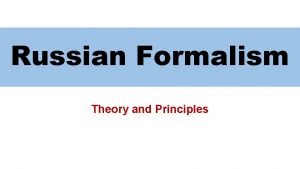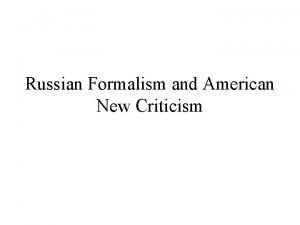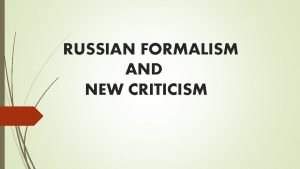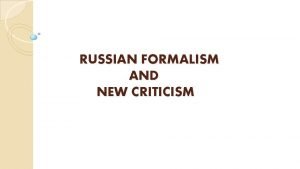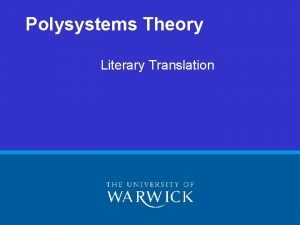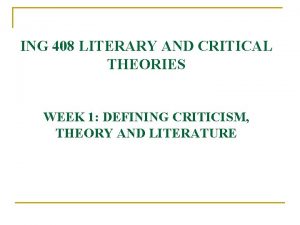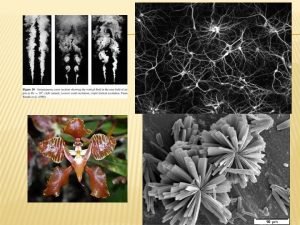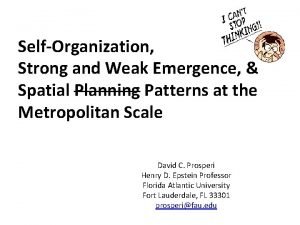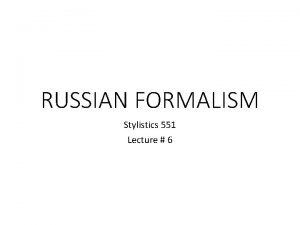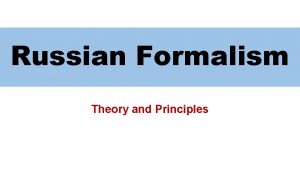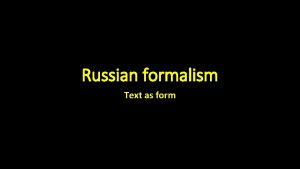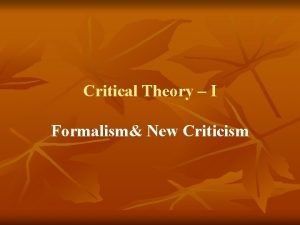Russian Formalism Theory and Principles Emergence and main









- Slides: 9

Russian Formalism Theory and Principles

Emergence and main concepts • Russian formalism was a school of literary criticism that emerged in Russia in the 1910 s and 1930 s. • Russian formalists are concerned about or preoccupied with the way literature is put together—how it is structured. • A literary text for them is a set of devices and technical elements that establish a literary structure. • Russian formalists established a ‘science’ of literature. The study of literature is only about an objective identification or listing of devices available in a particular text. So, a Russian formalists are interested in facts (objective description) about a text.

Emergence and main concepts • The study of literature means, for Russian formalists, suspension of interest in meaning and focus on structure and form of a text with smaller units that are literary devices. • Russian formalists exclude the moral, ideological, cultural, or historical dimensions of a text. They only considered literary form and technical elements.

Emergence and main concepts • While some Russian formalists adhere to the belief that analysis of literary texts is equated to the listing of elements of form and technique, other claimed both artistic devices with their effects and relation to the underlying meaning of a text should be highlighted, liberating the analysis process from its technical constraints. • Literariness is a set of devices that distinguish literary texts from non -literary ordinary ones. • Key figures: Viktor Shklovsky, Boris Eichenbaum, and Roman Jakobson

Defamiliarisation • Ordinary language tends to diminish our awareness of reality because it simply confirms things as we know them. The reality that the ordinary language evokes is already in our perception, so it does not need any inspection. • Literary language work in the opposite direction. It draws attention to perceptions by making the familiar unfamiliar and vice versa, thus generating artistic defamiliarisation.

Defamiliarisation • The devices of literariness could be deployed to impede our arrival to meaning, which is not automatically presented in literature but is generated by defusing the defamiliarisation elements or literary devices. • So, a literary text needs special investigation to the elements of defamiliarisation which roughen the surface meaning of a particular text.

Assumptions • 1. The job of a critic is to discover that literariness of a text—to highlight the devices and technical elements introduced by writers to make language literary. • Laying bare the device: a concept that was firstly used by Russian formalist Shklovsky to refer to the practice of presenting devices without any realistic motivation. 2. The study of literature is all about identifying the defamiliarisation elements (literary devices) and form. 3. Literary study is exclusively about form and technique.

Methodology (Action plan) 1. Identify the genre of the literary text. 2. Identify the structure of the literary text and highlight how actions or argument(s) are developed throughout that literary structure. 3. Investigate the defamiliarisation elements (literary devices) and highlight their development throughout the structure of the text. 4. Study other technical elements or relationships between the technical devices, if applicable.

Questions 1. What is the difference between ordinary and literary language according to Russian formalists? 2. Define defamiliarisation and explain why it is a central concept to Russian formalists? 3. New criticism and Russian formalism are both part of the early 20 th century formalist movement, yet they are completely different schools of criticism. Comment Asma
